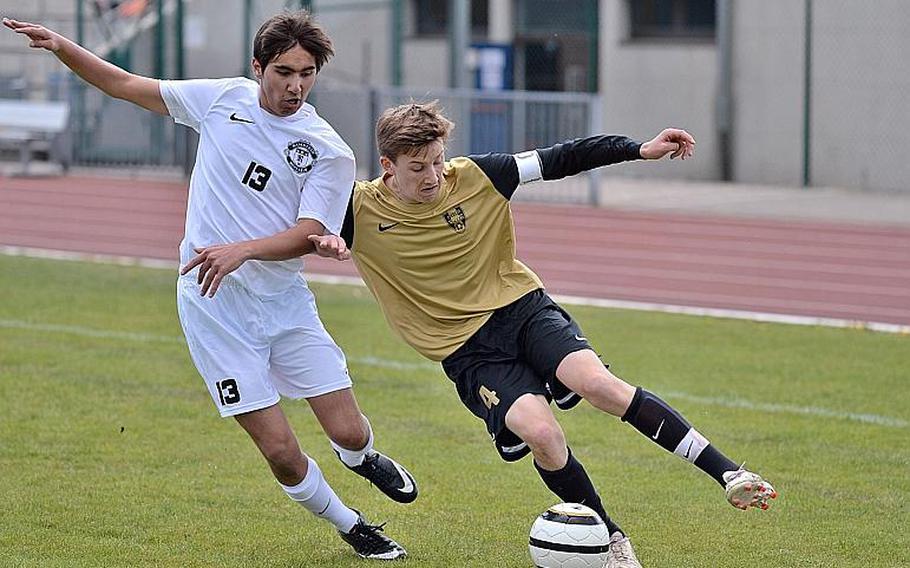
Ramstein's Deven Branham, left, and Patch's Christian Harvey fight for a ball during a game in Ramstein, Friday, April 18, 2014. The game ended 0-0. (Michael Abrams/Stars and Stripes)
Soccer games between evenly-matched teams are often low-scoring. Last weekend in DODDS-Europe, however, low-scoring turned into no-scoring.
Two DODDS-Europe boys soccer games ended in 0-0 ties last Friday, April 18. Division I opponents Ramstein and Patch played to a scoreless draw, as did Division II opponents Hohenfels and Bitburg.
One team going scoreless in a DODDS-Europe game isn’t uncommon. Regional scheduling often pits schools of disparate student populations and talent level against each other, resulting in lopsided shutout scores. And games between more evenly-matched teams can often end in a 1-0 or 2-0 decision.
But last weekend’s results may point to a growing trend towards low-scoring DODDS-Europe boys soccer games. Friday’s Ramstein-Patch and Bitburg-Hohenfels outcomes doubled the number of scoreless ties produced by any of the preceding two boys soccer seasons; the 2012 and 2013 DODDS-Europe boys regular-season schedules produced just one scoreless game apiece.
Further illustrating the point, three of the teams involved in those scoreless Friday games went on to participate in another shutout on Saturday. Bitburg defeated Ansbach 4-0, Hohenfels blanked Baumholder 3-0 and Patch edged Wiesbaden 1-0, with the Panthers’ only goal coming on a late penalty kick.
All told, there were 10 DODDS-Europe boys soccer games between April 18 and 19, and one or both teams went scoreless in eight of them.
DODDS-Europe boys soccer coaches pointed out a simple explanation for the trend: better defensive players. Two main factors are in play, coaches say. More players are willing to play defense today and coaches often place a greater emphasis on defensive skills and strategy.
As with any team sport, offensive production in soccer leads directly to individual acclaim. A player who scores a goal can look forward to cheers from the crowd, high-fives and chest bumps from teammates, a mention in media box scores and articles and the admiration of classmates the following Monday.
Conversations with coaches and defensive players reveal that such acclaim is less forthcoming for goalkeepers and back-line defensemen. As a rule, defensive players are at constant risk of playing the humbled antagonist to an opponent’s offensive glory, and a defensive miscue that leads to a goal against can be embarrassing for a fullback or goalie. Where offense presents opportunities, defense offers opportunities to fail.
Wiesbaden coach Ben Arcila, however, has seen that stigma subside.
There was a time, Arcila said, when nearly every player to enter his program expressed an interest to play midfielder or forward. Only the “less agile” players, he said, would be relegated to defense.
But an increasing appreciation for defense at the sport’s highest level has trickled down to the prep ranks, Arcila said, citing the international stardom of defenders Philipp Lahm of Bayern Munich and Sergio Ramos of Real Madrid. As a result, more talented players are interested in, or at least amenable to, assuming a defensive position.
“High school soccer reflects professional trends,” Arcila said. “Kids do not mind playing goalie or defense anymore.”
Meanwhile, coaches are emphasizing defense more than ever, and encouraging players at every position to examine their roles in preventing opposing goals.
Ramstein coach Dominik Ludes said he stresses defense as a team-wide effort, an approach that further erodes the crumbling stereotypical turf separating the glamorous, heat-seeking striker from the workmanlike cog on the back line.
“As soon as you lose possession of the ball, everybody on the field becomes a defender, and you try to win the ball back,” Ludes said. “It’s important for them to understand that not just the center backs or the keeper make up a good defense.”
Coaches report that their teams have bought into that concept. Friday’s scoreless ties didn’t damage the morale of the involved teams’ offensive midfielders and strikers, they said.
“They know how hard it is to score a goal most of the time,” Hohenfels coach Shawn Rodman said. “I do think they feel the pressure to score, but I also think they are more committed to playing defense themselves because our backs and keeper are working so hard.”
Teams wishing to contend for a European title will eventually need to find their offensive stride. But for now, as the teams make their preparations for the postseason, a stingy defense is seen as an indicator of future success.
Patch coach Eugene Macadagum said his team emerged from its zero-all draw with Ramstein with its confidence fully intact.
“It lifted their spirits knowing that they have a team that will be competitive at Europeans,” Macadagum said. “They do understand that the low-scoring game is a result of two evenly-matched teams meeting.”
Arcila put the issue in starker terms.
“No one wants to lose,” the Wiesbaden coach said. “Sometimes a tie is a win.”
Twitter: @broomestripes